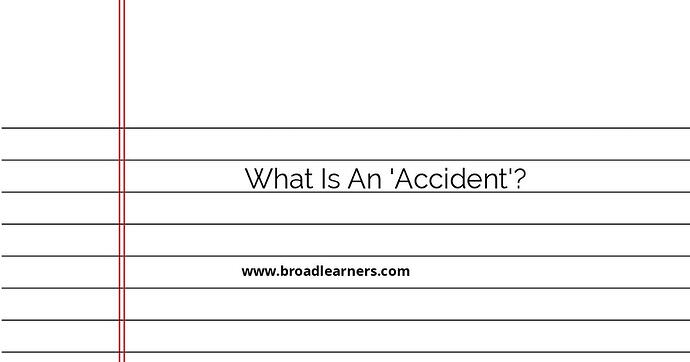An 'accident' is a common term used in everyday language, referring to an unexpected and unintentional event that can lead to harm, damage, or injury. The word is often used across different contexts, from road incidents to workplace mishaps and more. In this article, we will explore the term 'accident' in detail, including its definitions, examples, and nuances.
- Definition:
-
An 'accident' is typically defined as an unforeseen and unplanned event or circumstance that results in damage, harm, or injury. In legal and financial terms, accidents can also have implications concerning liability and insurance claims.
Common Contexts of 'Accident'
Though the term 'accident' can be applied to various scenarios, it usually pertains to one of the following contexts:
- Traffic Accidents: Incidents occurring on the road, usually involving vehicles. These might include car collisions, pedestrian mishaps, or bicycle accidents.
- Workplace Accidents: Unintentional events occurring within a work environment. Examples include slips, trips, falls, or machinery malfunctions.
- Home Accidents: Unplanned incidents within the home, such as falls, cuts, or burns.
- Public Area Accidents: Mishaps occurring in public spaces, such as parks or shopping centers, often involving falls or similar incidents.
Individual Examples of Accidents
To illustrate how accidents can vary, consider the following examples:
- Car Accident:
Example: While driving down the highway, sudden wet conditions cause a vehicle to skid, resulting in a collision with another car. Here, 'accident' is used to describe the unforeseen nature of the event.
- Workplace Accident:
Example: An employee slips on a wet floor in a factory, leading to an injury. The term 'accident' highlights the unintentional occurrence and resultant harm.
- Home Accident:
Example: A person accidentally cuts themselves while chopping vegetables in the kitchen. In this case, 'accident' denotes the unintentional injury.
- Public Area Accident:
Example: A pedestrian trips on an uneven pavement, sustaining injuries. This example shows how an 'accident' can occur in a public setting.
Legal and Insurance Implications
Accidents, especially those involving injuries or significant damage, can have legal and insurance implications:
- Liability: Determining who is at fault or responsible for the accident could lead to legal consequences.
- Insurance Claims: Filing claims for damages or injuries sustained may be necessary for compensation and recovery processes.
In conclusion, the term 'accident' encompasses a wide range of unexpected events, typically with negative outcomes. Understanding these incidents is crucial not only for personal knowledge but also for navigating potential legal and insurance matters.
Did I miss anything? Respond below
